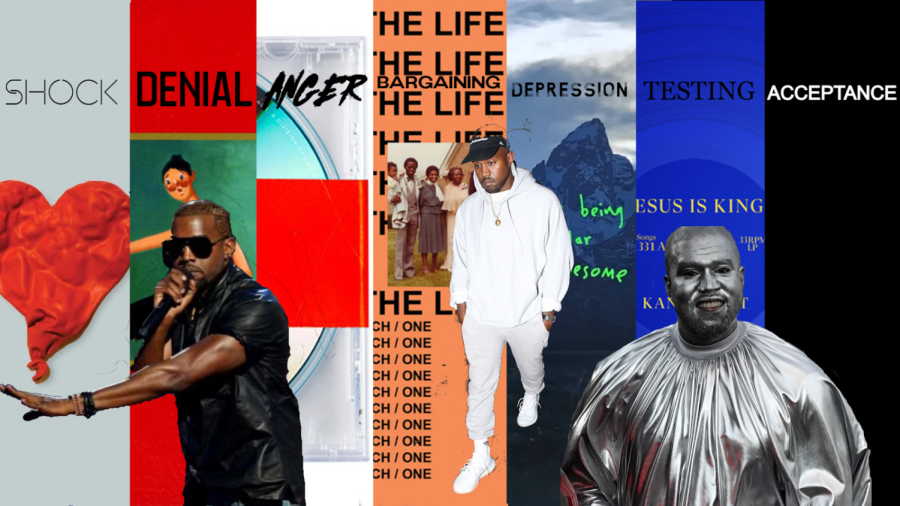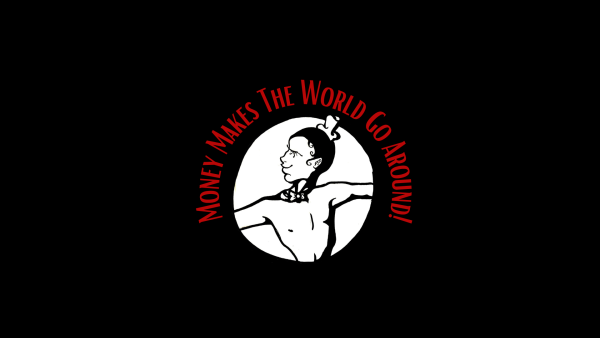Kanye West: A Story of Grief
Grief is a nearly universal experience. The way people react can be drastically different from one another. Some people get over a loss quickly; some go through the common 5-7 stages over a long time. Kanye West (now known as Ye, not to be confused with his album Ye) went through the common 7 stages (Shock, Denial, Anger, Bargaining, Depression, Testing, and Acceptance) as he processed his grief. He used his music as an emotional outlet, and because he was making music based on how he felt, Ye’s past 7 albums closely align with the 7 stages of grief.
In 2007, things looked to be going great for Ye and his music. With three hit albums out and more on the way, his triumph turned to tragedy when his mother Donda West died on November 10th. Ye largely credited his mother for his success. He would even go on to make whole songs and albums dedicated to her. Her death hit Ye extremely hard, and at what seemed like the worst time possible, his then-fiance Alexis Phifer broke up with him, making the situation even direr.
1. Shock (808’s and Heartbreak)
808’s And Heartbreak came out in 2008 and represents the first stage of grief, Shock. This album can be seen as Ye’s response to everything that had happened a year before. 808’s And Heartbreak goes deep into his emotions. In tracks like “Coldest Winter,” he mourns his mother’s death, singing about how he misses her and how he can’t get her out of his mind. In 2009, user YeezyTaughtYouWell commented on Kanye feeling emotionally drained and feeling somewhat lost. He dealt with his pain by channeling it into a sonically stripped-down album.
2. Denial (My Beautiful Dark Twisted Fantasy or MBDTF)
My Beautiful Dark Twisted Fantasy or MBDTF, is commonly known as not only Kanye’s best album but one of the best albums ever created. In 2020, RollingStone listed it as the 17th best album of all time. Many of the songs encapsulate the over-the-top attitude, with the fast beats and harsh lyrics that he is now known for. Representing the second stage Denial, this album almost ignores the problems listed in the previous subject matter, and instead, it focuses on redemption, and how Ye is going to regain his reputation. In songs like “Gorgeous” and “POWER,” Ye says, “I just needed time alone with my own thoughts, got treasures in my mind but couldn’t open up my own vault.”
And while MBDTF is beautiful, it still has a dark undertone. And even if things seem like there isn’t a lot going on, there’s still so much more behind the scenes.
3. Anger (Yeezus)
Yeezus in and of itself is an angry album that perfectly lines up with the third stage, Anger. Even just the first song, “On Sight ” throws out immediate angst that shows his anger much less towards himself, but towards the world. Yeezus takes on heavy topics like addiction, racism, and materialism and uses heavy and rough synths that simultaneously make his anger defined and rough. Yeezus shows the pain that is hidden behind the anger of his music. The closing track of the album, “Bound 2” explains how he found a form of happiness in love. For Ye it was his wife; maybe he didn’t find peace, but finding someone he can trust and be happy with.
4. Bargaining (The Life of Pablo)
Finding a balance between life and work can be hard in normal life. But with millions of fans, lots of family drama, and a very busy schedule, things can get out of control. The Life Of Pablo is the first of Ye’s gospel-style albums which represents the 4th stage, bargaining. In this album, Ye would explore the possibility of finding happiness within family, or within the music. In the song “Father Stretch My Hands Pt.1”, Ye sings about wanting his wife and family after an argument between the two. Other songs like “Famous” bring more drama to his name, making fan cultures even tenser. The Life of Pablo is a mess, and in the end, it works perfectly to prove its point since Ye never finds the answer in this stage. Not knowing how to decide between family and fame, it seems like Ye never really does.
5. Depression (Ye)
The self-titled album Ye is an emotional rollercoaster, which represents the Depression stage of grief. After a mental breakdown and clinical diagnosis of Bipolar Disorder, Ye would go to Wyoming to surround himself with friends and family while he made this album. The 7 tracks on Ye take the listener through many of the problems plaguing his mind, speaking on subjects like addiction and self-harm. The song “Ghost Town” encapsulates his bipolar disorder perfectly and annotation by user JBLO on Genius.com explains how “[The song paints] a picture of deep depression and manic euphoria side by side, ‘Ghost Town’ essentially is the musical epitome of Kanye’s bipolar disorder…”
6. Testing (JESUS IS KING)
The gospel album, JESUS IS KING, lines up well with the Testing stage. While Ye produced his soon-to-come album, he spent some time in Africa. It is thought that he had a spiritual awakening, where he would go deeper into Christianity and eventually devote the whole album to the faith. While Ye’s music has always had a lot to do with Christianity, this album takes it to new lengths. It was a rocky time for Ye with controversies including Donald Trump and TMZ floating around. Rebounding after the events of Ye though, JESUS IS KING has a better tone. With all the good that this stage had brought, it was almost like an over-correction for the past, which is where DONDA comes in as the final stage.
7. Acceptance (DONDA)
Ye’s 10th studio album DONDA is a warm memoriam of late Donda West. DONDA is filled with references to forgiveness and more importantly acceptance. Not just of Donda West’s passing, but Ye’s own actions. On the track, “Come to Life,” Ye sings about not letting the past affect you and moving on to better things. Wendel888 on Genius.com annotated that “Songs like this where Kanye sings about the significance of his wife and kids to him while beautiful instrumentals and synths play in the background make this song one of his most beautiful songs of all time.”
The track “Hurricane” has lyrics like “Everybody is so judgemental, everybody is so judgemental. Everybody hurts, but I don’t judge rentals.” Throughout the entire album, Ye becomes free and unburdened by his past.
The progression of Ye’s music over 13 years was not just the growth in music, it was the growth of a person. The emotion put into these albums is a beautiful example of grief.
Your donation will support the student journalists of Huntington Beach High School. Your contribution will allow us to cover our annual website hosting costs.
Thank you for supporting our program!







